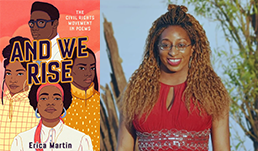- Categories:
An Indies Introduce Q&A With Erica Martin
Erica Martin is the author of And We Rise, a Winter/Spring 2022 Indies Introduce middle grade selection.

Martin was born and raised in Memphis, Tennessee. She enjoys making a difference in the world through political activism, reading, and writing. When she’s not reading and writing, you can find her editing, baking pies, or re-watching The Vampire Diaries for the millionth time.
Casey Gerken of Innisfree Bookshop in Meredith, New Hampshire, called this book a “beautiful history of the Civil Rights Movement for young adult readers where the art and form of the printed work tells as much about the movement as the poetry. A stunning read for all ages!”
Here, Martin and Gerken discuss the making of And We Rise.
Casey Gerken: And We Rise is such a unique debut. How did you come up with the inspiration to deconstruct the events of the Civil Rights Movement using text and photographs painted on the pages to re-tell the stories in such a powerful and compelling way?
Erica Martin: Thank you! And well, I spend a lot of time online, debating politics and controversial topics across social media platforms, and I noticed a common link in many arguments was the lack of information between feuding participants. For example, I would bring up a civil rights event, and most people had no clue what I was referencing! I try to stay open-minded when discussing race and history, because it’s true — not everyone knows everything, and a lot of people don’t even know they don’t know these things, because those things have been purposely omitted from history books for years.
So, I knew something needed to be written to fill in those blanks. Something that was accessible yet still comprehensive. Something that would give a general summary of those events and still leave enough room for people to research them on their own. And so, And We Rise was created. Because what better way to touch on that era than through poetry and photography, arguably two of the most beloved modern artforms?
CG: The photographs you've chosen seem very deliberate. What archives did you use, and how much time did you spend choosing just the right photograph for each telling?
EM: Yes! They are very deliberate indeed. When I first started browsing for photographs, I legitimately had no idea where to start. So, I simply started Googling [civil rights] pictures I had seen across the years and researched them until I found their original sources, which almost always led to full archived collections (Getty Images and AP Images). I had no clue there would be so many images for me to choose from, which led to me spending weeks sifting through collections to find the perfect photograph for each chosen section.
CG: What was the process for laying out the text on each page? More specifically, the pages counting the days of the bus boycott are moving in the simple fact that each day is represented as its own number on a line. Did you know this was how you wanted to handle this particular event, or did you write it all down first then begin to structure the verses to impact the story?
EM: I didn’t really have a planned process or anything; I just sort of went with what felt right, you know? I recall taking my emotions into account — everything I initially felt when I first learned of these horrors, especially the ones that had been left out of history books.
Regarding the Montgomery bus boycott and the counting, however . . . I felt like simply stating the number of days it took to resolve that event in a single line would not do it justice. 381 days is a long time, after all, and I wanted to create something that really drove that home.
CG: Do you consider yourself a writer or a storyteller?
EM: Well, I started off writing poetry in high school and had no intent of becoming an author/novelist. Like, at all. However, the more novels I read, the more I started loving the art of storytelling, and so, I started studying it.
But to answer your question, I, first and foremost, consider myself a writer more than a storyteller. Writing is subliminal for me, like breathing. Storytelling, on the other hand, takes a lot more brainwork for me to get “right.” And even then, there’s always room for improvement in that regard. But I’m up for the challenge, nevertheless, because this author thing — it’s what I was born to do.
CG: What is it about Vampire Diaries that makes you go back to re-watch it over and over
again?
EM: Years ago, I was all, “Why are people so obsessed with vampires?” Then, I watched The Vampire Diaries, and it clicked. The constant questioning of morality and humanity. The indulgence and appreciation of darker emotions. Of understanding and controlling your truest self. Suffice to say, I did not expect to grow so attached to the complexity of those themes. Huh. Who knew a show about the dead could make me feel so alive?
And We Rise by Erica Martin (Viking Books for Young Readers, 9780593352526, Hardcover Young Adult Poetry, $17.99) On Sale: 2/1/2022.
Find out more about the author at ericamartinwrites.com.
ABA member stores are invited to use this interview or any others in our series of Q&As with Indies Introduce debut authors in newsletters and social media and in online and in-store promotions. Please let us know if you do.

